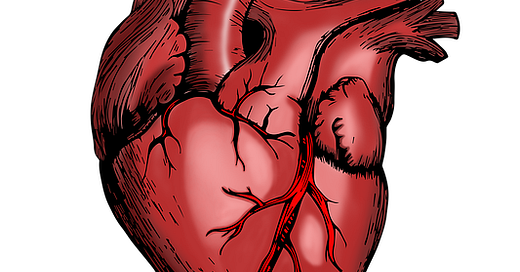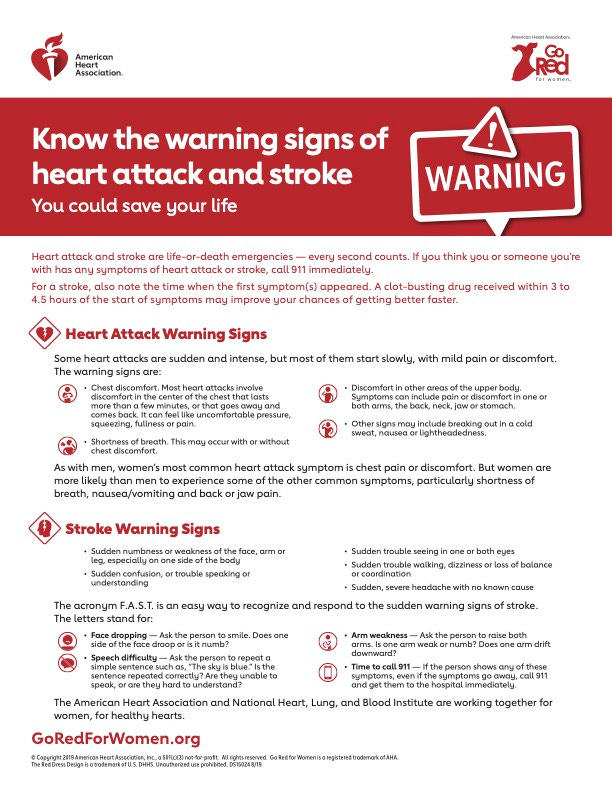We benefit from learning more about the wonders of the human body. Wellness always begins with our lifestyles: what we eat, how we move, and how we navigate the complexities of modern living. Aging is part of our lifespan - there is only one escape! I became curious about what happens to our bodies as we age and what strategies we can employ, given our access to wisdom, common sense, technology, and scientific information. Each month, I will feature an article on the aging human body. I am not a medical professional, and that’s a good thing because I write to be understood.

Here’s a trick question for your next get-together: Is the heart an organ or a muscle?
Most of us understand the heart is an organ but it’s also a muscle. The technical answer is that it is a muscular organ.
The heart operates using a specialized muscle tissue called cardiac muscle which is controlled by electrical impulses, generated by pacemaker cells. (The model for the pacemaker device.) This sustains the 24/7/365 work of the heart: pumping blood through our circulatory system.
Trivia for your heart-focused discussion:
The heart pumps approximately 100,000 times each day, moving 2000 gallons of blood.
During an average lifetime, the heart will have pumped 2.5 billion times.
Your heart manages blood pressure, flow, and volume, adapting to the immediate needs of your body. The fight or flight response demonstrates this beautifully: exposed to a perceived threat (stress) your heart increases its heart rate and pressure, diverts more blood to the muscles, and quickens the blood clotting function, in anticipation of a response requiring additional exertion and possible injury.
The network of blood vessels in our bodies measures over 60,000 miles.
Blood pressure rises as we age.
Five of the ten most commonly prescribed drugs in the US manage blood pressure and cholesterol.
Larger animals have slower heart rates so most women have faster heart rates than men, and your Chihuahua’s heart beats faster than your St. Bernard’s. (And those little ones bark more.)
The thumping sounds associated with heartbeats are created by valves between the chambers of the heart closing. Still, having your healthy heart discussion? Cue this dramatic reading of Edgar Allen Poe’s short story, The Tell-Tale Heart for the haunting thumps of a murdered man (starts at 17:20).
Our Aging Cardiovascular System
The natural process of aging impacts our cardiovascular system resulting in some of the following changes:
Arteriosclerosis: the “hardening of arteries,” which is the thickening of the arteries walls
Arrhythmias: changes in the heartbeat caused by the body’s electrical system changing
Atrial fibrillation: irregular heartbeat, linked to the thickening of the heart’s chambers walls
Hypertension: high blood pressure; risk increases as we age
Atherosclerosis: the build-up of fatty plaque on the arteries’ walls
Bottom Line: Our heart and its amazing ability to adapt have to work harder as we age because of these changes, pumping blood through clogged arteries that have become stiffer and less flexible.
Do you experience shortness of breath when exercising, walking, or going up steps? It’s because your heart is not getting the message that you need more oxygen-rich blood and is not able to move blood fast enough during exertion. Scientists have yet to figure out why this messaging slows, but I think the heart, like the rest of us, is a wee bit tired. Or maybe it’s just sick of being told what to do.
Your heart is only as healthy as your arteries.
Clean-up on Artery Aisle #1: Lower Blood Pressure & Cholesterol Levels
One in three people in the United States has high blood pressure. High blood pressure (also known as hypertension) can go undiagnosed and cause damage to some organs before it is detected. Hypertension is so common in our culture that every visit to a doctor’s office, clinic, or hospital includes a blood pressure reading.
Monitoring blood pressure is the starting point for people with diagnosed high blood pressure, and they might consider using a validated home blood pressure monitor to keep track of their pressure. The American Heart Association outlines how to do the procedure.
I don’t currently have high blood pressure but I have loved ones who do and from my perspective, this is an area of Western medicine that shines. High blood pressure pharmaceuticals are highly effective for managing hypertension. But it appears that dosage has to be increased over time and often additional drugs have to be added to maintain a healthy pressure. Adopting healthy lifestyle strategies can result in lower dosages of meds, fewer drugs, minimized side effects, and money saved.
Healthy lifestyle habits can benefit our cardiovascular system, whether we have high blood pressure or not, by helping to maintain healthy arteries.
High levels of LDL cholesterol and triglycerides can clog our arteries and raise blood pressure and are considered risk factors for heart disease, the leading cause of death in America. Cholesterol levels generally rise as we age so it’s wise to do regular testing, and consult with your healthcare provider to determine the best strategies for controlling it.
Lifestyle Strategies for a Healthy Cardiovascular System
Exercise and movement: Experts recommend exercising a minimum of 150 minutes each week. Stop: We can do better than this in my unscientific opinion. Up your movement game to one hour a day (420 minutes per week) of dedicated and varied exercise. The increased endorphins alone are worth it. The best exercise program for your body should include a balance of cardio, stretching/flexibility movement, strength building, and core muscle development. (Always check with your healthcare provider before adding exercise to a mostly sedentary lifestyle, especially if you have been diagnosed with heart disease.)
Check out Senior Shape Fitness which offers free exercise videos on YouTube. She offers modifications in each routine and great diversity in activities.
Diet: Eat a heart-healthy diet of primarily plants: 5-10 servings a day of vegetables and fruits. Add more plants by eating herbs, spices, nuts, & seeds. Plants provide fiber, phytonutrients, anti-inflammatory compounds, and antioxidants. Cold water fish and other seafood, pastured organic meats, and eggs provide high-quality protein. Avoid foods that are high in salt, contain refined sugars, and are overly processed.
Fats: A growing group of dietary experts is challenging the decades-long dogmatic guidelines promoting limited saturated fat intake. For many decades we were told that saturated fats (animal fats) contribute to heart disease but recent reviews of studies found no link between saturated fats and heart disease. The current research literature does not support the notion that dietary cholesterol increases the risk of heart disease in healthy individuals.
The most important diet is one that matches your health goals. Identify those goals first and then research the best approach.
The Dietary Approaches to Stop Hypertension (DASH) diet was designed specifically to help with high blood pressure. DASH includes a focus on limiting sodium.
Vices: Quit using all tobacco products and monitor the use of alcohol.
Alcohol seems to be the current elephant in the room: Its prevalence and acceptance in our cultures are beginning to be challenged. Based on research and meta-analyses, the World Health Organization recently stated that there is “no safe amount of alcohol.”
Chronic stress: Chronic stress can easily become the norm for daily living. People’s bodies and minds remain in an alert stage, which affects all of the body but specifically can raise blood pressure. What causes stress in an older person? Grief or loss, poverty, caregiving responsibilities, chronic health conditions or pain, and the new phase of retirement are common conditions for increased stress in older people. Daily exercise and walks in natural settings, meditation, tai chi, social activities, and psychotherapy can help with reducing and managing stress.
Women and Heart Disease
From the US Centers for Disease Control and Prevention:
Heart disease and stroke cause 1 in 3 deaths among women each year – more than all cancers combined.
Over 60 million women (44%) in the United States are living with some form of heart disease. Heart disease is the leading cause of death for women in the United States and can affect women at any age.
In 2021, it was responsible for the deaths of 310,661 women—or about 1 in every 5 female deaths.
Research has shown that only about half (56%) of US women recognize that heart disease is their number 1 killer.
More than 56 million women in the United States (44.3%) have high blood pressure (defined as 130/80 mm Hg or higher) or are taking blood pressure medicine5. This includes almost 1 in 5 women of reproductive age.
High blood pressure is often underdiagnosed in women, and fewer than 1 in 4 women with high blood pressure (23.3%) have their condition under control.
Black women are nearly 60% more likely to have high blood pressure than White women.
The risk increases for post-menopausal women because of the decline in estrogen production. It’s believed that estrogen affects the inner layer of the artery walls, maintaining flexibility, which allows for unrestricted circulation of blood.
Do yourself a favor and print off this PDF, Warning Signs and Symptoms of Heart Attack and Stroke and hang it on your refrigerator door.
Herbs for a Healthy Heart
Some of you know I am a home herbalist, and I use organically grown herbs daily to support my wellness.
A cardiac tonic herb nourishes and protects the heart. Select plants that are rich in flavonoids, which protect the heart from oxidative stress. (If taking pharmaceuticals, always check with your pharmacist about drug-herb interactions.)
Hawthorn: It has a long herbal history of serving the cardiovascular system, including assisting coronary circulation and increasing the strength of the heart’s contraction. Scientific studies now support the use. Hawthorn has no contraindications so it can be used by almost everyone.
Garlic: An abundance of scientific research supports garlic’s positive impact on the cardiovascular system, including lowering blood pressure, reducing cholesterol, and inhibiting clotting. Eating several cloves a day in meals is easy to accomplish.
Motherwort: Considered an excellent tonic for the heart, motherwort strengthens the cardiovascular system and is considered a specific remedy that can lower blood pressure.
Linden: As a vasodilator, linden flower tea can be useful for lowering blood pressure.
Hibiscus: Used regularly over time, hibiscus can help lower triglyceride levels and blood pressure. My go-to drink on a hot summer day.
One of my favorite herbal books is Body into Balance: An herbal guide to holistic self-care, by Maria Noel Groves and she offers this heart-healthy tea recipe in it. Blend a large batch of the herbs so it’s handy to brew and drink each day. She recommends 3 cups per day.
Red Heart Tea
1 part each of the following herbs:
Hawthorn berry, hawthorn leaf/flower, rooibos, hibiscus, linden, rose hips
Add 8 tsp. of the tea blend to a quart jar, pour three cups of boiling water in, cover, and steep for 20-30 minutes. Strain, add a bit of honey if desired, and enjoy your heart-healthy tea.
While sipping your tea, check out these two articles:
Rethinking Bereavement: How Stress and Depression Can Lead to Broken Heart Syndrome
The Placebo Effect of the Heart I offer this as a peek into the medical industry of research and practices. The mind-body connection is still absent in most Western medicine.
Thank you for being here. All of my posts are free, but if you’d like to support my work, you can do so by:
Liking and restacking this post so others are encouraged to read it.
Share this post via email or on social media.
Taking out a paid subscription to this Substack.
Comments are always welcome.







cayenne pepper is amazing vasodilator
What a fantastic article! Thank you!